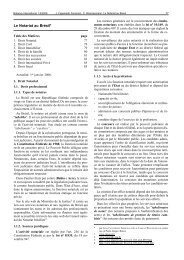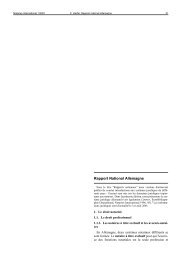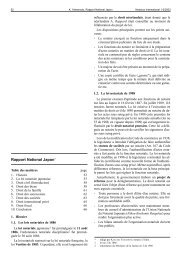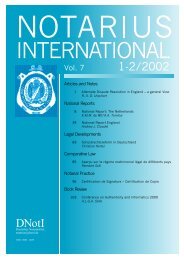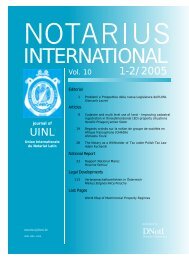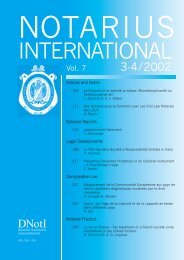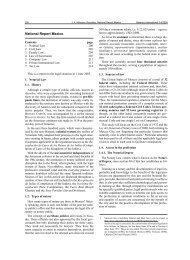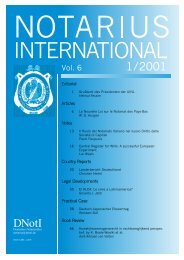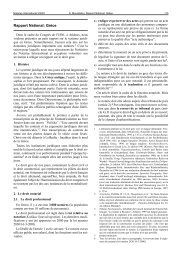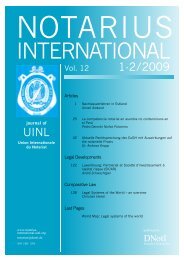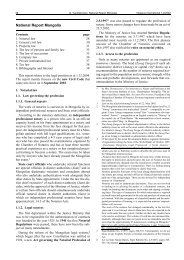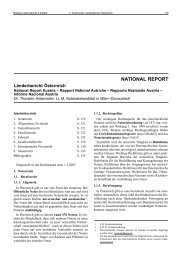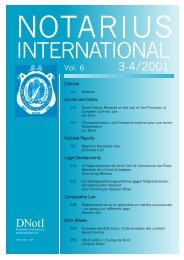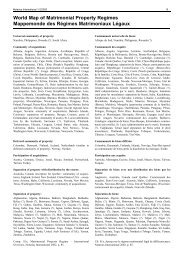Create successful ePaper yourself
Turn your PDF publications into a flip-book with our unique Google optimized e-Paper software.
282 E. Brancós Núñez, The Right of Withdrawal and Function of the Notary <strong>Notarius</strong> <strong>International</strong> 3-4/<strong>2005</strong><br />
rise to a rescission option that differs from arbitrary<br />
renunciation. A lack of information has to be proven.<br />
That is not arbitrary renunciation. It is necessary to show<br />
that the information was not sufficient and proof of this<br />
leads us directly to the judicial process. If it is necessary<br />
to prove good cause in order to extinguish the effects of<br />
a contract this constitutes cancellation and not arbitrary<br />
withdrawal.<br />
5.2 Unfair terms<br />
Nor does the right of withdrawal follow from the existence<br />
of an unfair term. Such a term is deemed not to<br />
exist in the contract by virtue of the doctrine of partial invalidity.<br />
Renunciation does not add anything at all.<br />
Nor is its origin to be found in the need tangibly to acknowledge<br />
the subject matter of the contract. The old<br />
form of sale “on trial” or “on approval” would apply<br />
here. On the other hand, it would be difficult to justify in<br />
transactions such as timesharing where it would, on the<br />
whole, be unusual for a purchaser to go and see a property<br />
within 14 days of the contract if he has not already<br />
done so. Or in the case of an insurance policy, where benefits<br />
are usually paid out long after the one month normally<br />
stated as the final deadline for exercising a right of<br />
withdrawal.<br />
Nor in the case of defects of form giving rise to the<br />
non-existence of a contract.<br />
Justification for a right of withdrawal is to be found<br />
in the need to remedy ill-considered acts occasioned by<br />
excessively aggressive sales techniques. In that case,<br />
however, it is absurd for it to apply in cases where a notary<br />
is involved. The mere fact of attending the offices of<br />
a notary, the provision of explanations by the notary and<br />
the services that he can render all militate against any<br />
possibility of an ill-considered act.<br />
However, protection is not afforded to a purchaser just<br />
by the veracity of the terms in the contract that he has<br />
signed. There are also other laws, regulations or even circumstances<br />
which can have a decisive influence on the<br />
contract: rules governing foreign investment, relating to<br />
capacity or ability to make disposals, on tax, the economic<br />
regime of a marriage, environmental protection,<br />
land charges and property commitments etc. which the<br />
consumer is not going to know about unless he takes specialist<br />
advice or counsel. Even though the fundamental<br />
aim of the right of withdrawal is to prevent ill-considered<br />
deeds, that is to say to promote responsible choices, the<br />
right of withdrawal does not help to enlighten him: someone<br />
who does not know the rules cannot have any idea of<br />
their consequences. An unknown danger cannot be<br />
feared. Hence the protection afforded by a right of withdrawal<br />
is illusory because it is – primarily – based on a<br />
supposition that is just as false: namely, that the consumer<br />
is aware of everything that might influence his decision.<br />
He lacks both informed consent, which it is the<br />
function of the notary to achieve, and the essential foundation<br />
on which to base his contractual consent. The right<br />
of withdrawal is even misleading because it leaves a purchaser<br />
in ignorance; he cannot foresee something the existence<br />
of which he is unaware.<br />
5.3 Cooling-off period<br />
It must perforce be concluded that, given the need to<br />
protect purchasers (whether consumers or not) from illconsidered<br />
deeds, the cooling-off period is more advantageous<br />
than the right of withdrawal. The cooling-off period<br />
is set out in the French law of 23 December 2000<br />
(notification and transmission of draft authenticated deed<br />
+ 7 day cooling-off period) and in German law (Article<br />
17(2)(a) of the BeurkG) and is undoubtedly more effective<br />
than the right of withdrawal – particularly when one<br />
considers that a sale of real estate normally involves a<br />
mortgage loan that would have to be repaid on the exercise<br />
of a right of withdrawal, thus making it necessary for<br />
the whole amount to be kept on deposit throughout the<br />
whole time that the right of withdrawal could be exercised.<br />
A short duration serves no purpose at all; a long duration<br />
impedes the transaction.<br />
There is also a marked tendency on the part of consumers<br />
to stop several purchase transactions at once<br />
thanks to the right of withdrawal, which leads us to suggest<br />
as an alternative route a certain degree of causation<br />
or justification for the right of withdrawal. For example:<br />
the barring of a right of withdrawal where the clauses in<br />
a contract exactly follow the provisions that the law lays<br />
down as supplementary terms and where the contract<br />
item has been the subject of prior inspection. If one<br />
knows the object in question, if one accepts the price and<br />
if the contract terms exactly follow what is laid down by<br />
law to fill a gap in an express agreement, it is impossible<br />
to see why a right of withdrawal should be allowed – except<br />
to satisfy the unsubstantiated whim of a purchaser!<br />
5.4. Final conclusions<br />
Finally, reverting to principle, even on a less exacting<br />
and detailed analysis of the right of withdrawal it would<br />
seem to be a means of enabling the legislature to “sleep<br />
peacefully” since it affords the consumer purchaser a<br />
wide degree of protection. However, on a careful analysis<br />
of the role of the right of withdrawal by reference to<br />
unfair terms (no role), imperfect information (the solution<br />
is a rescission action and not a right of withdrawal)<br />
or the conclusion of an ill-considered contract (in a<br />
complex contract it creates the false illusion that the consumer<br />
has a period in which to respond to any kind of<br />
problem that he is not capable of envisaging) it must be<br />
concluded that the right of withdrawal is of very little<br />
use.<br />
It can only be effective in the context of the conclusion<br />
of a contract of minimal difficulty or complexity where<br />
very aggressive marketing methods are used.<br />
This is not the case with real estate transactions,<br />
where the only measure that might make any sense is the<br />
cooling-off period – which is always implicit where a notary<br />
is involved.



